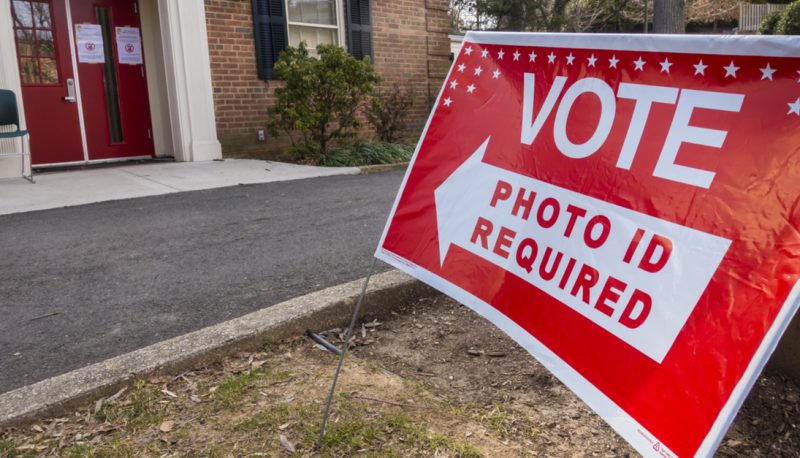“Confirmed Judges, Confirmed Fears” is a blog series documenting the harmful impact of President Trump’s judges on Americans’ rights and liberties. Cases in the series can be found by issue and by judge at this link.
Trump Eleventh Circuit Judge Elizabeth Branch wrote a 2-1 opinion affirming a lower court order that upheld an Alabama voter identification (ID) law on summary judgment without a trial, even though it was undisputed that minority voters were twice as likely as whites to lack ID. The July 2020 case is Greater Birmingham Ministries v. Secretary of State for Alabama.
In 2011, Alabama passed a law requiring that all voters have photo id. The law did not take effect until 2013 and was challenged in federal court by a number of voters and organizations. They contended that the law violated the constitution and the Voting Rights Act (VRA) because it had both discriminatory purpose and effect. In 2018, a district court granted summary judgment against the plaintiffs, dismissing their case without a trial. The lower court judge acknowledged that minority voters were less likely to have photo id that is acceptable under the law but ruled that “no one is prevented from voting” as a result of the statute.
Trump judge Elizabeth Branch wrote a 2-1 opinion affirming the lower court. Branch concluded that “no reasonable factfinder” could find that the law was “unconstitutionally discriminatory.” She maintained that the law was justified as a response to “well-documented and public” cases of voter fraud, and that although Alabama certainly had a history of racial discrimination in voting, the state should not be “penalized” for that history and there were no statements of discriminatory intent by legislators with respect to the specific law at issue.
With respect to the effect of the law, Branch acknowledged that evidence showed that minority voters were twice as likely as white voters to lack photo ID acceptable to the state. She maintained, however, that the actual difference and effect was “miniscule” because only 1% of white voters vs. 2% of minority voters did not have ID, and that there was “no evidence” that the law actually “caused” denial of the ability to vote because of race, as she claimed the law required. In short, she concluded, there was not “sufficient evidence” to allow a “reasonable factfinder” to conclude that minority voters have “less opportunity” to participate in the political process due to the statute.
Judge Darrin P. Gayles strongly dissented. With respect to the law’s purpose, he began by noting Alabama’s “deep and troubled history” of race discrimination and voter suppression. He pointed out that although the law was passed in 2011 with a three-year implementation schedule, the Alabama Attorney General announced the day after the Supreme Court struck down the pre-clearance provisions of the VRA in 2013 that the law could now be implemented without Justice Department pre-clearance, and the law was put into effect within four months of the Court’s ruling. The record showed, Gayles went on, that in-person voter fraud was “virtually non-existent,” and that statements by Alabama legislators about voter ID before the 2011 law was passed — such as one claim by a powerful legislator that the lack of photo ID requirements is “very helpful to the Black powerful structure” – constituted “probative evidence” that should have been considered at a trial, not dismissed at the summary judgment phase. The dissent specifically disagreed with Branch’s conclusion that legislators’ racist statements about Black and Latino Alabamans were irrelevant in showing a racist motive for the voter ID law because they were not made in connection with that particular bill.
Gayle similarly wrote that there were “genuine issues of material fact” that precluded summary judgment concerning the impact of the law. The plaintiffs in the suit, he noted, include minority voters who contend that the voter ID mandate directly “impacts their ability to vote.” Although the percentages without photo ID may appear small, Gayle continued, the disparity with white voters is significant and translates into more than 21,000 minority voters who “did not have acceptable photo IDs” in Alabama at the time summary judgment was granted. At a time when elections are so “closely decided,” Gayle pointed out, “any impact on voter turnout may be significant and probative.” A “judge or jury at trial,” he concluded, should decide whether the law’s impact on minority voters is “meaningful,” and the case should not have been thrown out on summary judgment.
In short, Gayle explained, there is a “wealth of direct and circumstantial evidence” of discriminatory purpose and effect of the voter ID law “that should be considered at trial.” As a result of Branch’s opinion, however, that will not happen, and the Alabama law will remain on the books.

